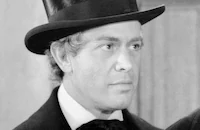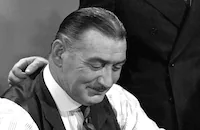Orchids to You
Cast & Crew
William A. Seiter
John Boles
Jean Muir
Charles Butterworth
Ruthelma Stevens
Harvey Stephens
Film Details
Technical Specs

Synopsis
The board of directors of New York's exclusive Ritz Plaza skyscraper want Teddy Stuyvesant, their befuddled stockholder with a controlling interest, to grant them power of attorney to allow them not to renew the lease of one of their commercial tenants so that a branch of a bank can open in its place in the lobby. Teddy, who does not know that the tenant in question is florist Camellia Rand, who has many times refused his marriage proposals, interrupts the meeting before he signs to go propose to Camellia again. Thomas Bentley, the attorney for the hotel, believes that Camellia can easily be beaten because, being a woman, she will get emotional. She refuses his demands, however. Soon she learns that one of her customers, man-about-town George Draper, is having an affair with Tom's wife Evelyn, who is unhappy with her husband's obsession with work. On Easter Sunday, Camellia goes with Teddy to an orphanage, where they see "Professor Hippo," actually Tom, who grew up in the orphanage, in a long-haired wig and mustache, entertaining the children with magic tricks. When Camellia introduces him to Teddy, she discovers that Teddy is the stockholder with controlling interest, and Teddy, discovering that Camellia is the tenant, refuses to sign Tom's paper. Accepting defeat, Tom hires Camellia to arrange flowers for his third wedding anniversary, hoping to show Evelyn that he has turned over a new leaf regarding his attention to her. However, she cancels their dinner to be with Draper, while saying that her sick mother needs her. At the Spring Flower Show, Draper's wife Alice tells Camellia that she is going to divorce her husband and after exhibiting his florist bill from her shop, demands to know to whom the flowers were sent. Camellia, who has grown fond of Tom, refuses to tell. After Alice hires Tom, an acquaintance of the Drapers, to represent her, Evelyn, fearing that Camellia will reveal her secret, tells her that she wants to make amends with her husband and offers Camellia the name of a woman who has agreed to testify that the flowers were sent to her. Camellia refuses to go along and icily states that she will not reveal Evelyn's identity. During the Drapers' divorce trial, Camellia refuses Tom's demands that she name the woman, and she is sentenced to ten days in jail for contempt as the divorce action fails. When she returns to her shop after serving her time, she finds it filled with customers attracted by the trial's publicity. Teddy, trying to help out, has taken over as manager. When Tom comes to apologize to Camellia, Teddy interrupts them with what he thinks is a mistake in the books: that a bill sent to Draper should instead have been sent to Tom because the orchids were sent to Tom's wife. Now realizing his wife's infidelity, Tom reopens divorce proceedings, after which he takes a world cruise for a year. Next Easter, the children at the orphanage are bored as Teddy tries to entertain them dressed as Professor Hippo to Camellia's piano accompaniment. When Tom arrives and takes Teddy's place, the audience responds excitedly. Afterward, Tom proposes to Camellia and she accepts.

Director

William A. Seiter
Cast

John Boles

Jean Muir

Charles Butterworth
Ruthelma Stevens

Harvey Stephens
Arthur Lake

Spring Byington

Sidney Toler

John Qualen
Patricia Farr

Arthur Treacher

Margaret Dumont
Maurice Black
Edwin August
Robert Manning
Phil Tead
Jack Hatfield
Grace Hale
Stanley Andrews
Landers Stevens
William Worthington
Lucille Ward

Walter Walker
Morgan Wallace

Lee Phelps
Monty Vandegrift
Roland Hamblen
May Wallace
Veda Buckland
Alma Chester
Lillian West
Stanley Blystone
Philo Mccullough
Orrin Burke
Guy Usher

Huntley Gordon
Barlowe Borland

Edward Keane
Arthur Stuart Hull
Zaruhi Elmassian
Fred Wallace
Richard Brodus
Tom Mcguire
Jane Buckingham
Joe Mcguinn
Crew
Bartlett Cormack
Robert Dillon
Howard Estabrook
Merritt Gerstad
Charles Grayson
Sam Hellman
Renè Hubert
William Hurlbut
Robert T. Kane
Arthur Lange
Alice D. G. Miller
Jack Otterson
Gordon Rigby
Clinton Scollard
Leslie Selander
James Seymour
Oley Speaks
Glenn Tryon
E. Clayton Ward

Film Details
Technical Specs

Quotes
Trivia
Notes
According to news items, the title was taken from newspaper columnist and radio celebrity Walter Winchell's popular phrase of especial commendation. According to the Toledo News Bee, Winchell summed up the film by stating, "Scallions for Fox Film Co." In addition to singing "Sylvia," which is called by Hollywood Reporter an "ever-popular" ballad and was written in 1914, John Boles sings an unidentified nursery rhyme. According to news items in March 1935, Clive Brook was originally scheduled to play the male lead. News items additionally note that Jean Muir was borrowed from Warner Bros. and wore fifteen gowns; that William A. Seiter landed a long-term contract with Fox after this film; and that Shirley Temple kept the doll house used in the film. Shooting was completed a day and a half ahead of schedule, according to a Hollywood Reporter news item.












